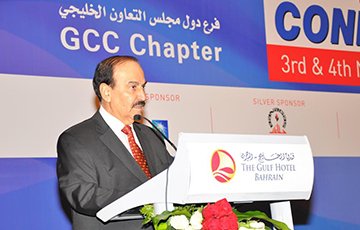ID :
386148
Tue, 11/03/2015 - 18:16
Auther :
Shortlink :
http://m.oananews.org//node/386148
The shortlink copeid
Energy minister opens technical conference

Manama, Nov. 3 (BNA): Energy Minister Dr. Abdulhussain Mirza has opened the 23rd Annual Technical Conference of the Society of Gas Manufacturers, organised by the Gas Manufacturers Association (GCC Branch), and held in coordination and cooperation with the National Oil and Gas Authority (NOGA), Saudi Aramco and several oil and gas companies from Bahrain, the region and beyond.
Welcoming the participants who included researchers and those interested in the field, the minister said Bahrain would benefit from the scientific and practical papers being presented at the event, which is characterized by the diversity of events and meetings and significant participation of engineers, technicians and professionals along with executives from the oil and gas sector.
The minister said the theme of the conference, Effective Technology Solutions to Gas Industry, has taken an altogether new dimension in today’s rapidly changing fuel price scenario. "As gas industry professionals, we need to work on sustainable technology and adopt non-traditional austerity measures to cope with the emerging tough market conditions.
"Among other strategies, cost-cutting will be key to the coping process of our industry for a couple of years, at least, while oil producer countries adjust to an environment of lower prices, and the gas sector does not escape the situation."
He said current market conditions, arising from the slump in oil prices, are a global issue and not something that has affected the region alone. "However, different worlds have to deal with the same situation differently, so the West may have a different solution that makes sense to them, while our solution might be different."
He added that according to market experts, the current low prices are going to stay on for several years, longer than during the previous downturn, which came about due to a drop in temporary demand.
"The current price drop is caused by the supply side shale revolution and has pushed more and more companies toward trimming operating costs and investment budgets.
"That said, I believe the oil and gas industry in the Middle East, in spite of this extremely challenging period, will continue to grow profitably, once companies improve in areas such as operating and functional excellence, at the same time building up administrative and procedural capabilities across workforces."
He said with rising global energy demand, the oil and gas industry has a wide range of challenges and opportunities across the upstream, midstream, downstream and oilfield services sectors. Companies must also navigate through the changing regulatory environment."
Dr. Mirza said on the brighter side, the industry is learning to use the price drop as an opportunity for operational improvements.
"The Middle East petrochemical industry has grown really fast over the past 30 or so years, thanks to the low-priced gas feedstock. The region’s petrochemical producers will now require a broad mobilization to build the managerial and technical capabilities needed to develop and further business growth.
"Capturing the gas flows associated with oil production that were previously flared and instead channelling those flows as very low-priced feedstock for chemical production has made it possible for us to build an immense and highly profitable industry."
He said the Gulf Cooperation Council (GCC) countries contributed 11 per cent of global petrochemical-capacity growth over the past 10 years and are now a leading global producer and supplier to world markets of ethylene and derivatives and methanol. "Clearly, given the region’s hydrocarbon wealth, there is potential to develop new gas production."
Initiatives are already under way to develop non-associated gas production, but one should also consider warnings of the typically long lead times on such projects, which could pose an additional threat of gas-supply squeeze in the coming years, he added.
"On top of this, Middle East producers have historically tended to depend on their joint-venture partners for technology and for marketing; that account for 60 per cent of today’s capacity."
He said while many companies have built up production capacity over the past 30 years, "we now need to match up functional capabilities in parallel."
He said in Bahrain, they believed in cost cutting without compromising on quality and choose sustainable and environment friendly technology for their oil and gas projects.
"All our major oil projects are on track. All our oil and gas industry decisions are judiciously considered at every stage by our wise leadership.
"Recently, Bahrain signed a $100 million contract with the British company Petrofac to build a gas dehydration facility at Tatweer Petroleum, with a capacity of 500 million standard cubic feet gas per day, the first among many projects planned to meet rising domestic demand.
"We have also recently awarded contracts for building a 42 km land and 73 km offshore infrastructure for our new Bahrain-Saudi oil pipeline project."
He said Bahrain and Saudi Arabia signed contracts worth $300 million to lay the new 350,000-barrel per day (bpd) pipeline – eventually increasing to 400,000 bpd – between the two countries. The link is due to be operational in 2018 and will replace the older line, which has a lesser capacity and will enable Bahrain Petroleum Company (Bapco) to expand the processing capacity of its refinery."
Saudi Aramco Executive Director of Gas Operations Abdullah Al-Ghamdi later held a panel discussion on the theme of the conference and ways to develop the gas industry in the Gulf Cooperation Council (GCC).
The association, set up in 1993, serves as a forum for the exchange of ideas, techniques and information in the gas industry. The first conference was held in Bahrain and it has since become an annual affair.
(Electricity and Water Authority (EWA))





